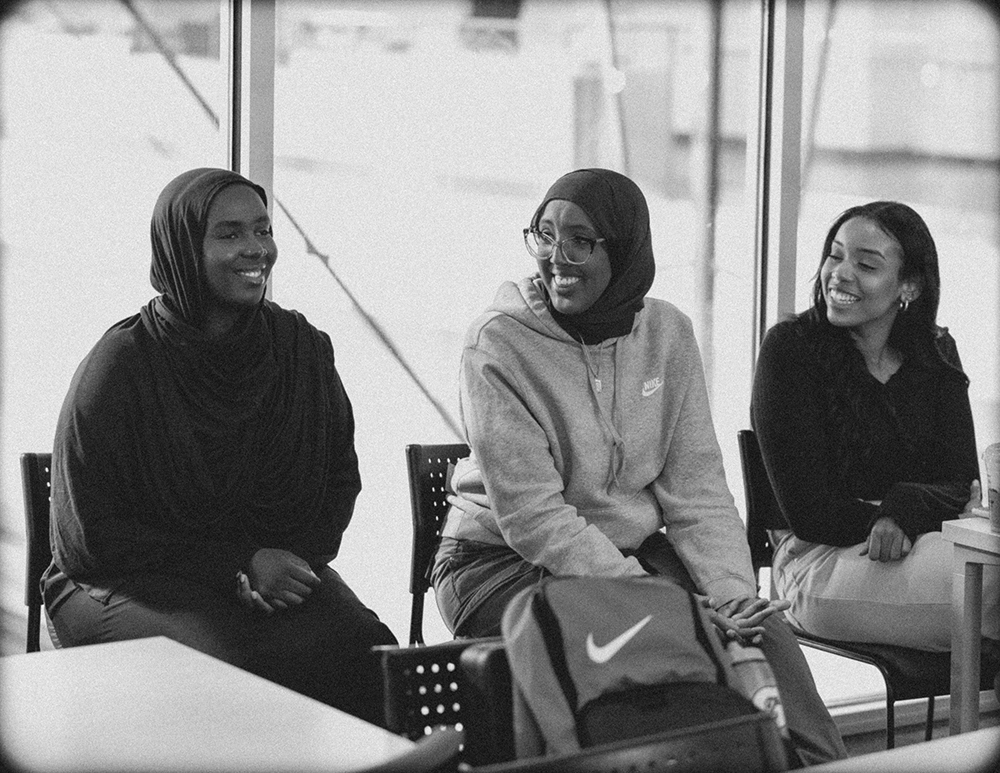They were tired of gun violence in their community. So they took matters into their own hands
Support from all over Toronto from Black organizations to the Raptors president helped bring these friends’ idea to life.
Last September, Mohamed Hassan, received 50 tickets to take youth from his non-profit organization to a Toronto Maple Leafs pre-season game.
For many of them, it was a first. One of the kids turned to him and asked how much the tickets usually cost.
Hassan, a marketing manager at Tennis Canada, didn’t know, so they searched up the prices and saw tickets were a couple of hundred dollars on StubHub.
“Leafs games are that expensive?” said Hassan. “I didn’t know it was that much of a barrier for Somali kids to go to a Leafs game.”
That was one moment that reinforced why Hassan and longtime friend Ahmed Shiddo created an organization dedicated to Somali youth.
Since last fall, Somali Together has hosted about 40 kids from across the city biweekly in North York to partake in workshops, mentorship and hands-on learning experiences.
The organization’s mission is to enhance, on a consistent basis, the lives of Somali youth through education, community, culture and sport.
The idea came to Hassan and Shiddo following a tragedy in 2019. A friend of a friend, 18-year-old Aseel Yehya, died suddenly as a result of gun violence. The two friends reflected on this ongoing violence over the phone, ahead of Yehya’s funeral prayer.
“This … wasn’t the first time we faced (this) in our community,” Hassan said. “Sometimes you don’t even know how to react anymore. You become numb to the gun violence in Toronto, and you become numb to all the other issues our community faces.”
So, Shiddo and Hassan made phone calls and gathered about 50 community members at Etobicoke’s Khalid Bin Al-Walid Mosque to speak about what was going on in their neighbourhood.
By the end of 2019, gun violence in Toronto reached record levels and Shiddo was tired. He was tired of seeing friends mainly at funeral prayers. The 27-year-old didn’t want to become desensitized to losing friends and wanted to be around his people more, in life.
More importantly, Shiddo felt like it was time for his generation to do something, rather than leaving it up to the elders in the Somali community.
“All of our parents come from a war-torn country and they left everything they knew behind. We can’t even imagine what’s that like,” said Shiddo. “A new world, new language, new country — this is all for us. We have to capitalize on that or it was all for nothing.”
Hassan and Shiddo saw a need for attention and services dedicated to Somali youth. In 2014, 25 per cent dropped out of the TDSB, compared with 14 per cent of students overall. Among Somali boys, the dropout rate was a staggering 33 per cent.
On top of that, fewer Somali students applied to college or university, and 50 per cent were more likely to be suspended, placed in special education classes and have lower EQAO scores.
Eventually, Shiddo and Hassan got an opportunity to make that first gathering more concrete.
Raptors president and vice-chairman Masai Ujiri travelled to Somalia the summer of 2019 with the basketball youth organization he co-founded, Giants of Africa. Ujiri returned to the city wanting to know what he could do for the Somali community in Toronto.
Ilwad Elman, who helped co-ordinate the Somalia trip and basketball clinic for Somali girls, heard about the Etobicoke mosque meeting and reached out to Hassan.
And that’s how Somali Together was born. What started off as getting folks to gather at the mosque, turned into a sit-down proposal with Ujiri in December 2021, which gave the co-founders momentum.
During 2022, they put together a board of directors and sought funding to grow. The Foundation for Black Communities (FFBC) was an early supporter and provided a $25,000 sports and recreation grant.
Omar Omar, a director of community investment for FFBC, thought Somali Together was a perfect fit.
“They were doing the work in a way that resonated with them, and we were interested in supporting and learning from that. We see them as teachers in many ways,” Omar said.

